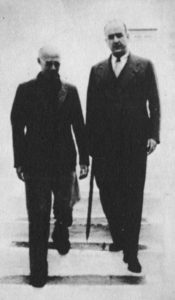The Colossus of Maroussi by Henry Miller
Henry Miller came to Greece in 1939, a few months before the WWII broke out, after a visit to the valley of the Dordogne, in France. His friend Lawrence Durrell invited him in Corfu where he was living for some years.
Durrell’s “poetic” letters were very inviting, and as he admits in the beginning of the novel, he was ready to travel to Greece due to a neighbor of his in Paris: “I would never have gone to Greece had it not been for the girl named Betty Ryan who lived in the same house with me in Paris… She is not exactly a story-teller, this girl, but she is an artist of some sort because nobody has ever given me the ambiance of a place so thoroughly as she did Greece.”
Henry Miller with George Katsimbalis

Miller expresses his thoughts on what is joy, peace, and freedom – mainly of expression. Through his travel impressions, he gives us his observations on people, nature, and history. The Colossus of Maroussi is a travel novel, but it is also a philosophical one. His encounter with the literary and artistic “generation of the 30s” a group of intellectuals who introduced modernism in Greek literature and art – George Katsimbalis, George Seferiades, the painter Nikos Hadjikyriakos-Ghika, and others – was decisive in how he viewed pre-war Greece.
“Marvelous things happen to one in Greece – marvelous good things which can happen to one nowhere else on earth. Somehow, almost as if He were nodding, Greece still remains under the protection of the Creator. Men may go about their puny, ineffectual bedevilment, even in Greece, but God’s magic is still at work and, no matter what the race of man may do or try to do, Greece is still a sacred precinct – and my belief is it will remain so until the end of time.”
“I never knew the meaning of peace, until I arrived at Epidaurus… I am talking of course of the peace that passeth all understanding. There is no other kind.”
“Greece had done something for me which New York, nay, even America itself, could never destroy. Greece has made me free and whole… To those who think that Greece to-day is of no importance let me say that no greater error could be committed.”
“My friend Katsimbalis for whom I have written this book, by way of showing my gratitude to him and his compatriots, will I hope forgive me for having exaggerated his proportions to that of a Colossus… A more
It is amazing how Miller is inspired by Greece and its civilization. The last words of the novel are: “Greece herself may become embroiled as we ourselves are now becoming embroiled, but I refuse categorically to become anything less than the citizen of the world which I silently declared myself to be when I stood in Agamemnon’s tomb. From that day forth my life was dedicated to the recovery of the divinity of man. Peace to all men, I say, and life more abundant!”
From The Colossus of Maroussi, by Henry Miller, c. 1941, A New Directions Book, 2010, pp. 1, 15, 68, 184, 207, 210.
L. V. Paidoussi


